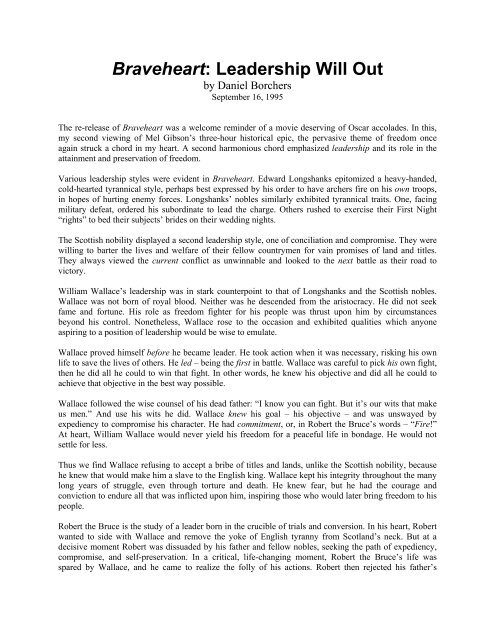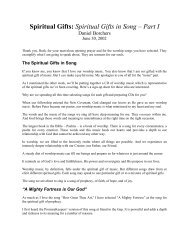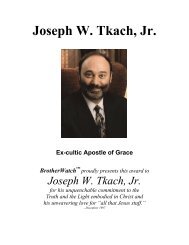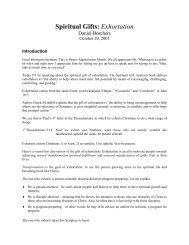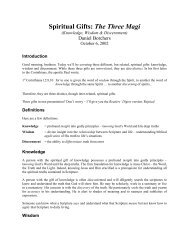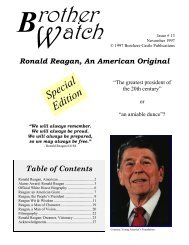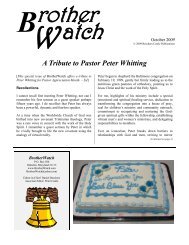Braveheart - Leadership Will Out - BrotherWatch
Braveheart - Leadership Will Out - BrotherWatch
Braveheart - Leadership Will Out - BrotherWatch
You also want an ePaper? Increase the reach of your titles
YUMPU automatically turns print PDFs into web optimized ePapers that Google loves.
<strong>Braveheart</strong>: <strong>Leadership</strong> <strong>Will</strong> <strong>Out</strong><br />
by Daniel Borchers<br />
September 16, 1995<br />
The re-release of <strong>Braveheart</strong> was a welcome reminder of a movie deserving of Oscar accolades. In this,<br />
my second viewing of Mel Gibson’s three-hour historical epic, the pervasive theme of freedom once<br />
again struck a chord in my heart. A second harmonious chord emphasized leadership and its role in the<br />
attainment and preservation of freedom.<br />
Various leadership styles were evident in <strong>Braveheart</strong>. Edward Longshanks epitomized a heavy-handed,<br />
cold-hearted tyrannical style, perhaps best expressed by his order to have archers fire on his own troops,<br />
in hopes of hurting enemy forces. Longshanks’ nobles similarly exhibited tyrannical traits. One, facing<br />
military defeat, ordered his subordinate to lead the charge. Others rushed to exercise their First Night<br />
“rights” to bed their subjects’ brides on their wedding nights.<br />
The Scottish nobility displayed a second leadership style, one of conciliation and compromise. They were<br />
willing to barter the lives and welfare of their fellow countrymen for vain promises of land and titles.<br />
They always viewed the current conflict as unwinnable and looked to the next battle as their road to<br />
victory.<br />
<strong>Will</strong>iam Wallace’s leadership was in stark counterpoint to that of Longshanks and the Scottish nobles.<br />
Wallace was not born of royal blood. Neither was he descended from the aristocracy. He did not seek<br />
fame and fortune. His role as freedom fighter for his people was thrust upon him by circumstances<br />
beyond his control. Nonetheless, Wallace rose to the occasion and exhibited qualities which anyone<br />
aspiring to a position of leadership would be wise to emulate.<br />
Wallace proved himself before he became leader. He took action when it was necessary, risking his own<br />
life to save the lives of others. He led – being the first in battle. Wallace was careful to pick his own fight,<br />
then he did all he could to win that fight. In other words, he knew his objective and did all he could to<br />
achieve that objective in the best way possible.<br />
Wallace followed the wise counsel of his dead father: “I know you can fight. But it’s our wits that make<br />
us men.” And use his wits he did. Wallace knew his goal – his objective – and was unswayed by<br />
expediency to compromise his character. He had commitment, or, in Robert the Bruce’s words – “Fire!”<br />
At heart, <strong>Will</strong>iam Wallace would never yield his freedom for a peaceful life in bondage. He would not<br />
settle for less.<br />
Thus we find Wallace refusing to accept a bribe of titles and lands, unlike the Scottish nobility, because<br />
he knew that would make him a slave to the English king. Wallace kept his integrity throughout the many<br />
long years of struggle, even through torture and death. He knew fear, but he had the courage and<br />
conviction to endure all that was inflicted upon him, inspiring those who would later bring freedom to his<br />
people.<br />
Robert the Bruce is the study of a leader born in the crucible of trials and conversion. In his heart, Robert<br />
wanted to side with Wallace and remove the yoke of English tyranny from Scotland’s neck. But at a<br />
decisive moment Robert was dissuaded by his father and fellow nobles, seeking the path of expediency,<br />
compromise, and self-preservation. In a critical, life-changing moment, Robert the Bruce’s life was<br />
spared by Wallace, and he came to realize the folly of his actions. Robert then rejected his father’s
agenda, declaring “I want to believe as he does! I’ll never be on the wrong side again!”<br />
Wallace was a man of peace (“If I can live in peace I will.”) who was forced by those who would enslave<br />
him to go to war. His pursuit of peace and freedom demonstrated inner qualities of leadership worthy of<br />
emulation. His actions, as well as his commitment to a worthy cause, inspired those around him and<br />
rallied a nation to victory. <strong>Will</strong>iam Wallace’s leadership was instrumental in leading a nation to freedom,<br />
and converting a future king into a leader who would lead his people to liberty.<br />
We can all follow Wallace’s example in our own lives, and should expect nothing less from those who<br />
would lead us.


